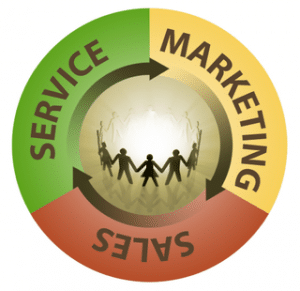What Sales Marketing Policies Should Every Business Have?

Businesses of all sizes and industries need defined sales and marketing policies. These guidelines help sales and marketing teams promote products and services, hit their target audience, and fuel revenue growth. What sales marketing policies should every business have?
The Importance of Sales and Marketing Policies
The sales policy sets out strategies and tactics for selling products or services. It includes defining the target market, pinpointing key customers, pricing structures, and sales quotas. This makes sure the sales approach is consistent and customers are happy.
The marketing policy is also important. It decides how businesses present themselves in the market, build brand awareness, and communicate with their target audience. It could involve social media, email campaigns, print ads, or TV commercials. This makes sure the messaging is consistent and builds a positive reputation.
Customer relationship management needs guidelines too. Sales teams must be trained in best practices for handling customer inquiries and complaints. Providing good customer service helps create long-term relationships and repeat business.
Data on customer preferences helps successful sales and marketing. Gathering demographic information helps companies tailor offerings to customers. Analyzing this data helps find trends or patterns for future campaigns.
It’s important to review and update sales and marketing policies based on industry trends and consumer behavior changes. Adapting policies keeps companies agile and ahead of competitors.
To ensure the success of your business, it is crucial to have well-defined sales and marketing policies. Explore the importance of these policies in driving business success. Discover the invaluable role that sales and marketing policies play in shaping your company’s growth and profitability.
The Role of Sales and Marketing Policies in Business Success
Sales and marketing policies are key to business success. They determine the strategies and rules for promoting and selling products or services. Clear policies guarantee consistency, better customer satisfaction, and more sales revenue.
These policies help to:
- Identify target markets
- Develop convincing messages
- Carry out successful promotional activities
Also, they help with branding, advertising, and digital marketing to create awareness and demand for products/services. Plus, they let companies measure performance accurately. They set objectives, metrics, and targets to align with business goals. This data-driven approach enables ongoing improvement in strategies and tactics.
Research by the Sales Management Association found that companies with defined sales processes had a 33% higher win rate than those without. This shows the importance of having structured policies to drive business success.
Sales Policies Every Business Should Have
To ensure and efficient sales process and boost your business’s growth, it is essential to establish clear sales policies. In order to address this, this section will explore the importance of implementing a robust pricing strategy and policy, setting sales targets and quotas, and creating a comprehensive commission and incentive policy. By understanding and integrating these sub-sections, you can optimize your sales and marketing efforts effectively.
Pricing Strategy and Policy
Setting the right pricing strategy is essential for any business. It affects profitability and how customers view it. A well-defined pricing policy guarantees transparency and consistency. Here are important factors to consider when forming your pricing strategy:
- Market Research: Analyze market trends and competitors’ prices. Find a competitive yet profitable price point.
- Value-based Pricing: Estimate the value your product or service brings to customers. Focus on benefits and outcomes, not just features.
- Cost-plus Pricing: Work out all costs related to producing, marketing, and delivering your product or service. Add a reasonable profit margin.
- Psychological Pricing: Use psychological techniques like charm pricing, bundle pricing, or premium pricing to influence customers.
- Dynamic Pricing: Implement strategies that adjust prices based on demand, seasonality, or customer segments. Maximize revenue and optimize sales.
- Discounting Policies: Create clear guidelines for discounts, such as bulk purchases, seasonal promotions, or loyalty rewards programs. Keep consistency to prevent brand dilution.
Businesses can also offer value-added services or innovative bundling options. Provide extra benefits at and attractive price. Review your pricing strategy regularly. This is due to changes in the market, customer feedback, and internal cost fluctuations.
Optimize your profits! Develop a well-defined pricing strategy that matches your business goals and customer value proposition. Don’t miss out! Meeting the sales target is like finding a unicorn – except the unicorn is real and your salary depends on it!
Sales Target and Quota Policy
Our policy helps us measure performance and set realistic goals for our sales representatives. It encourages healthy competition between team members and keeps their efforts in line with company objectives.
This Sales Target and Quota Policy also helps us evaluate the effectiveness of our sales strategies and find areas for improvement. By tracking progress regularly, we can maximize our revenue.
Pro Tip: To further motivate your sales team, think about offering incentives or rewards for hitting targets. Get ready to hunt down those dollar signs – our commission and incentive policy will turn your sales team into a pack of hungry wolves, ready to snatch every opportunity!
Commission and Incentive Policy
Let’s dive deep into the uniqueness of our Commission and Incentive Policy. It rewards employees not just for revenue, but also for customer satisfaction and team collaboration. This holistic approach motivates them with monetary rewards and exceptional customer experiences.
We can see how effective this policy is through Sarah’s success story. She exceeded her targets by building strong relationships with her clients, leading to high customer satisfaction ratings that earned her bonuses. Plus, her proactive participation in teams resulted in project completions and incentives. This shows how our policy drives performance and fosters excellence in all areas of business.
Marketing policies are essential – if customers can’t find you, you might as well be selling invisibility cloaks!
Marketing Policies Every Business Should Have
To ensure and effective marketing strategy, implement essential marketing policies like branding and positioning, advertising and promotion, and customer relationship management (CRM). Each policy plays a pivotal role in boosting your business’s success and reputation. By understanding the significance of these policies, you can reach your target audience, establish a strong brand identity, and cultivate valuable customer relationships.
Branding and Positioning Policy
Branding and Positioning Policy is key in business. It’s all about strategies and guidelines that help create a brand image and stand out from competitors. Let’s look at some key elements:
| 1. Brand Identity | Design a catchy logo, choose colors and fonts, and use consistent branding across communication channels. |
| 2. Target Audience | Research to know the ideal customers’ demographics, needs, preferences, and behaviors. |
| 3. Competitive Analysis | Analyze rivals’ branding to spot market gaps and differentiate. |
| 4. Consistent Messaging | Make sure brand values, mission, and unique selling points are conveyed. |
Branding and Positioning Policy also involves online reputation management, consumer trust-building, strategic partnerships, innovative products, and customer experience management.
One example: “Brewed Delights” used their policy to succeed in a competitive market. They created a unique and captivating brand identity, personalized customer experience, and used social media platforms to engage their target audience. The result? They positioned themselves as the go-to coffee shop for and authentic experience.
The lesson here? Advertising is like dating – be original and show up with fresh ideas.
Advertising and Promotion Policy
To comprehend the importance of Advertising and Promotion Policy, let’s delve into the core elements it contains:
| Key Elements | Description |
|---|---|
| Target Audience | Figure out the specific group of consumers to be reached |
| Marketing Channels | Select the channels through which promotions are done |
| Budget Allocation | Apportion financial resources for ad campaigns |
| Content Creation | Generate creative and interesting content for ads |
| Monitoring | Regularly observe and evaluate marketing efforts |
Apart from these essential points, businesses also have to keep other factors in mind while formulating their Advertising and Promotion Policy. They must ensure protocol with legal regulations, maintain consistency of messaging across different media, and change their strategies as per market trends.
An exciting bit of history related to this topic is Coca-Cola’s advertising journey. In 1886, when Coca-Cola was first released, its creator John Pemberton advertised it with hand-painted signs on walls. This humble start laid the base for one of the most successful advertising campaigns ever.
From classic print media ads to inventive digital marketing campaigns, Advertising and Promotion Policy has changed drastically over time. Companies today strive for creativity and efficiency in capturing their audience’s attention amidst intense competition.
Keep in mind, and effective policy can enable organizations to build a strong brand presence and interact with their target audience in meaningful ways. With thorough planning, implementation, and continuous assessment, firms can maximize their ROI through well-executed advertising and promotion strategies. CRM: Use your marketing skills to reach out to customers, not to stalk them!
Customer Relationship Management (CRM) Policy
CRM policy is paramount for businesses, as it concentrates on nurturing and maintaining enduring customer relations. Strategies are employed to better customer contentment, loyalty, and preservation.
By using a CRM policy, businesses can manage customer communication proficiently by providing personalized involvement. This involves examining customer data to comprehend their tendencies, needs, and behavior patterns. CRM systems can also be used to streamline sales processes, improve communication channels, and automate tasks.
Moreover, the CRM policy also includes recommendations for handling customer complaints and resolving concerns quickly. This ensures customers feel respected and that their worries are taken into account. By attending to problems in a timely fashion, businesses can increase customer delight and better their overall reputation.
To take maximum benefit from a CRM policy, businesses should concentrate on training employees on the significance of constructing strong customer relationships. By equipping them with the necessary skills and knowledge, they can efficiently interact with customers in every interaction. This personalised approach makes a positive impression and fosters faith between the business and its customers.
In addition, monitoring key performance indicators (KPIs) related to customer satisfaction is essential. By tracking metrics such as customer retention rate, repeat purchases, and NPS, businesses can detect areas for development and take proactive measures to tackle any challenges or gaps.
In conclusion, a well-defined CRM policy assists businesses to cultivate faithful customers who act as brand promoters. It permits businesses to optimize their marketing strategies by utilising data insights and tailored approaches for different segments. By giving priority to customer relationships through a comprehensive CRM policy, businesses can promote growth and attain long-term success. Keep and eye on your marketing policies like a detective tracking down a suspect – your sales will testify to their effectiveness.
Implementation and Monitoring of Sales and Marketing Policies
To effectively implement and monitor sales and marketing policies, the key lies in training and communication as well as regular review and evaluation. These sub-sections offer solutions to ensure seamless integration and accountability in your business policies.
Training and Communication
| Training Method | Description |
|---|---|
| Onboarding | Introducing to company policies and values |
| Product Training | Teaching sales team product features/benefits |
| Sales Techniques | Training on sales techniques |
| Communication | Setting clear internal communication channels |
Plus, regular performance evaluations identify where more training is needed. This encourages improvement within the sales team.
Pro Tip: Get the sales team to give feedback on their training needs. This helps tailor training programs to address any gaps or obstacles faced.
Why check sales/marketing policies when you can blame the weather for bad results?
Regular Review and Evaluation
Regular review and evaluation of sales and marketing policies is vital for businesses. It helps ensure these policies are successful in achieving goals and can be altered when needed. Doing a thorough review allows companies to identify what needs to be improved and make decisions on future strategies.
To facilitate this, key metrics must be gathered and analyzed in and organized way. Here’s a table of the metrics:
| Metric | Description |
| Sales Revenue | Total money from sales activities |
| Conversion Rate | Percentage of leads that become sales |
| Customer Acquisition Cost | Average cost of getting a new customer |
| Customer Lifetime Value | Net profit from a customer throughout their time with the company |
To get the full picture, feedback from internal staff (e.g. sales reps) and external people (e.g. customers) should also be collected. This can give insight into how effective the current policies are and what needs to be improved.
Harvard Business Review states that companies that review and evaluate their sales and marketing policies often do better than those who don’t. Managing and tracking these policies can be difficult and unpredictable, but it’s necessary for success.
Sales Marketing Policies
As this article comes to a close, it’s obvious that every business needs well-defined sales and marketing policies. They work as rules to ensure success.
Firstly, it’s essential to have a certain target market and customer segmentation strategy. By understanding customer needs and preferences, companies can customise their marketing messages and sales approaches. This helps them reach out to their targeted audience and increase conversion rates.
Moreover, a multi-channel marketing approach is a must in this digital age. Companies should use social media, email marketing and search engine optimization to grow their reach and interact with potential customers. This not only boosts brand visibility but also improves customer experience.
In addition, businesses must form strong relationships with customers. Gaining their trust and loyalty through personalised communication, great customer service and post-purchase follow-ups can have a positive impact on customer retention. Through these relationships, companies can gain positive word-of-mouth referrals.
Finally, implementing data-driven marketing strategies can give useful information about consumer behaviour and help businesses make informed decisions. By regularly tracking metrics such as conversion rates, website traffic and customer feedback, companies can discover areas of improvement and optimise their sales and marketing efforts.
Frequently Asked Questions

FAQs for What sales & marketing policies should every business have?
1. What is a sales and marketing policy?
A sales and marketing policy is a set of guidelines and rules that businesses implement to define their strategies for promoting and selling their products or services. It outlines the principles and approaches to be followed by the sales and marketing teams.
2. Why is it important for businesses to have sales and marketing policies?
Sales and marketing policies are crucial for businesses as they provide a structured and consistent approach to sales and marketing activities. They ensure that all employees are aligned on the company’s brand messaging, target audience, pricing strategies, and promotional tactics.
3. What should be included in a sales and marketing policy?
A comprehensive sales and marketing policy should include the objectives and goals of the sales and marketing efforts, strategies for customer acquisition and retention, pricing guidelines, branding guidelines, social media guidelines, and a code of conduct for sales and marketing personnel.
4. How can businesses ensure that their sales and marketing policies are effective?
To ensure the effectiveness of sales and marketing policies, businesses should regularly review and update them to align with changing market conditions and customer preferences. It is also important to provide regular training and support to the sales and marketing teams to ensure they fully understand and implement the policies.
5. Are there any legal considerations when developing sales and marketing policies?
Yes, businesses need to consider legal regulations and compliance requirements while developing sales and marketing policies. This includes adhering to advertising laws, data protection regulations, intellectual property rights, and fair competition practices.
6. How can businesses enforce their sales and marketing policies?
Businesses can enforce their sales and marketing policies by clearly communicating the policies to all employees and providing appropriate channels for reporting violations or seeking clarification. Regular performance evaluations should also include and assessment of adherence to the sales and marketing policies.
















Leave a Reply